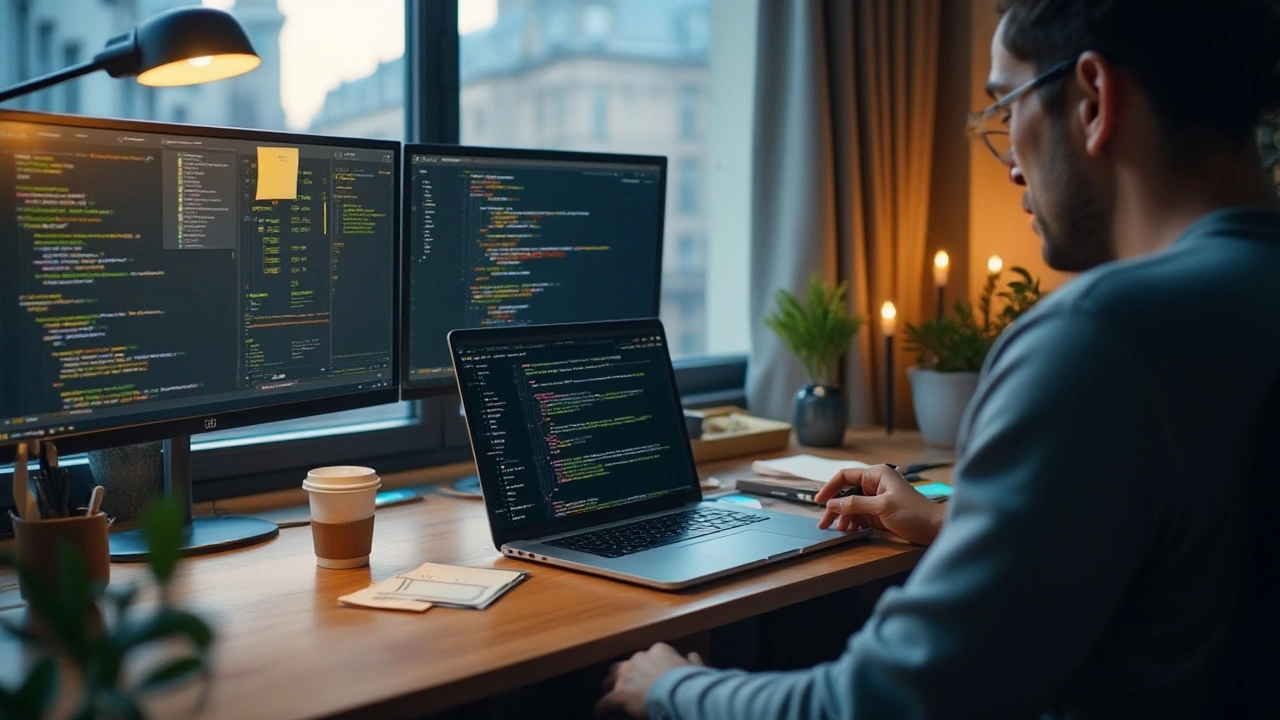Speed and efficiency in programming don't just come from natural talent; they're a result of learned habits and smart work. Whether you're a seasoned developer or a beginner, speeding up your programming tasks can make a massive difference to your productivity.
One key aspect is time management. Knowing how to break down your tasks, prioritize, and set realistic deadlines can significantly reduce wasted time. It's essential to stay organized and make sure you're not spending more time than necessary on each part of the project.
Another critical factor is effectively using tools and resources. Numerous coding environments and libraries are designed to speed up the process. Learn them well and use them to your advantage without getting bogged down by options.
Optimizing workflow is also vital. Create a consistent and smooth routine that works best for you. Automate repetitive tasks and maintain clean, well-documented code to save time for revisions and future projects.
Lastly, developing good habits can go a long way. From regular breaks to staying updated with new trends and techniques, it all adds up to more efficient and enjoyable coding sessions.
- Time Management in Coding
- Effective Use of Tools and Resources
- Optimizing Workflow
- Habits for Better Coding Efficiency
Time Management in Coding
Time is often the most crucial resource for a developer. Whether you're working on a tight deadline or trying to balance multiple projects, effective time management can make or break your productivity. One of the first steps to mastering time management is understanding where your time goes. Using tools like time trackers can give you a clear picture of how you spend your day. Apps such as Toggl or Clockify are popular among developers for this purpose.
Breaking down larger tasks into smaller, manageable sections is another essential strategy. This method, often referred to as chunking, can help avoid feeling overwhelmed. By focusing on one small task at a time, you can make steady progress and keep the momentum going. Setting realistic deadlines for each chunk can also help keep you on track without causing unnecessary stress.
Prioritization is another critical aspect. The Eisenhower Matrix is a great tool for this. It helps you categorize tasks into four quadrants: important and urgent, important but not urgent, urgent but not important, and neither. By focusing on what's important and urgent, you can make the most impact with your time.
Another useful technique is the Pomodoro Technique, a time management method developed by Francesco Cirillo in the late 1980s. The idea is to work for 25 minutes and then take a 5-minute break. After four 25-minute sessions, take a longer break, typically 15 to 30 minutes. This method helps maintain high levels of focus while also preventing burnout.
"The key is not to prioritize what’s on your schedule, but to schedule your priorities." - Stephen Covey
To optimize your coding time, it's also essential to set up an efficient work environment. Make sure your tools and resources are easily accessible. Keep your workspace organized to avoid wasting time searching for things. A dual-monitor setup can be beneficial for multitasking, allowing you to keep documentation open on one screen while coding on the other.
Using version control systems like Git can also save you time, especially when collaborating with a team. It allows you to track changes, revert to previous versions if needed, and work on different branches without affecting the main codebase.
Managing Interruptions
Interruptions can be a significant time drain. Whether it's phone calls, emails, or colleagues stopping by for a chat, it's essential to minimize these distractions. One effective way to manage interruptions is to set specific times for checking emails and messages. This way, you can focus on coding without frequent breaks in concentration.
Establishing clear boundaries with colleagues and family members is also crucial. Letting them know your working hours and when you're available can reduce unplanned interruptions. If you're in a shared workspace, using noise-canceling headphones can signal that you're in focus mode.
Finally, don't forget to incorporate some flexibility into your schedule. While having a structured plan is essential, life can be unpredictable. Allowing some buffer time for unexpected tasks or issues can help you stay on track without feeling overwhelmed.

Effective Use of Tools and Resources
Using the right tools and resources can dramatically impact your coding speed and efficiency. Almost every programming language has a set of accompanying tools that can help you write, debug, and optimize your code faster. For example, integrated development environments (IDEs) like Visual Studio Code, IntelliJ IDEA, and PyCharm come equipped with features that assist in auto-completion, error detection, and code formatting. Knowing how to harness the power of these tools is essential for any developer aiming to improve their programming efficiency.
Don't underestimate the power of libraries and frameworks. These are collections of pre-written code that you can integrate into your projects, saving you the time you'd spend writing these functions from scratch. For instance, if you're working on a web application, using a framework like React for JavaScript or Flask for Python can simplify your tasks significantly. These frameworks not only speed up development but also provide a consistent structure, making your code more maintainable.
Another significant resource is version control systems like Git. Not only do these systems help you keep track of changes, but they also allow you to collaborate more effectively with other developers. You can create branches to experiment with new features without affecting the main codebase, pull in updates from team members, and roll back to previous versions if something goes wrong. The importance of mastering a tool like Git can't be overstated; it’s a game-changer for coding collaboration and disaster recovery.
“The best lines of code are the ones you never have to write.” — Martin Fowler.
Automation tools are also a fantastic way to save time. Tools like Jenkins or Travis CI can automate your testing and deployment processes. Imagine the time you’d save if you didn’t have to manually test and deploy your code every time you made a change. Setting up these tools might take some initial investment of time, but the return on investment is well worth it.
Online resources and communities are a goldmine for problem-solving. Websites like Stack Overflow, GitHub, and various programmer-specific forums provide excellent platforms for you to get instant help. Often, someone else has already faced the problem you’re encountering now, and a solution is just a search away. Participating in these communities can also deepen your understanding and help you connect with other like-minded developers.
Last but not least, never stop learning. The technology field evolves rapidly, and new tools, libraries, and frameworks are always emerging. Following key developers and technology blogs, attending webinars, and participating in coding bootcamps can offer new insights and techniques that can make your work more efficient and effective. The more you know about the tools available to you, the better you can leverage them to speed up your coding process.

Optimizing Workflow
When it comes to speeding up your programming, having a streamlined workflow can make a world of difference. An optimized workflow can help you move through your tasks more smoothly and efficiently. One way to enhance your workflow is by utilizing keyboard shortcuts. They might seem insignificant, but shortcuts can save valuable seconds that add up over days and weeks. For instance, mastering shortcuts in your integrated development environment (IDE) can let you navigate, edit, and run code faster without lifting your hands from the keyboard.
Another key aspect is automating repetitive tasks. Automation tools such as build systems (like Maven or Gradle) and continuous integration/continuous deployment (CI/CD) pipelines can save you hours of manual work. These tools ensure that your code is consistently tested and deployed with minimal effort on your part. For instance, Jenkins, a popular automation server, can handle building, testing, and deploying your code, taking a huge load off your shoulders.
Maintaining clean and well-documented code can't be overstated. Clean code is easier to read and debug, which means you spend less time figuring out what each part does. Always aim to leave your codebase in a better state than you found it. This habit often goes hand in hand with effective use of version control systems like Git. Commit your changes in small, manageable chunks with clear messages so that you and others can easily follow the history of changes.
Consistency in your workflow can also help. Setting up a daily routine that includes regular breaks and a clear work structure can boost your efficiency. Using tools like Pomodoros—timed intervals of work followed by short breaks—can help maintain a high level of focus. Additionally, consider using project management tools like Trello or Jira to keep track of your tasks and deadlines. This ensures you stay on top of your workload without feeling overwhelmed.
Embracing pair programming can also be beneficial. Pair programming involves working alongside a colleague to write code. This can lead to higher-quality code and faster problem-solving, as two minds are often better than one. According to Martin Fowler, a software development expert, "Pair programming provides a great way to share knowledge and foster better communication, which can significantly improve speed and quality."
Lastly, stay updated with new techniques and tools that can help you work more efficiently. Technology is constantly evolving, and new tools are developed regularly to address common pain points. Following blogs, attending webinars, and participating in coding communities can expose you to these innovations. Sometimes, adopting a new tool or methodology can drastically cut down the time you spend on certain tasks.

Habits for Better Coding Efficiency
Habits are what truly shape a programmer's productivity and effectiveness over time. Developing good habits can make the coding process faster and more enjoyable. One fundamental habit is consistent practice. Just like with any skill, the more you code, the better and faster you'll become. It's like training a muscle; consistent effort leads to improvement.
Another vital habit is writing clean code. Clear, concise, and well-documented code can save hours of work later. So many bugs and issues can be avoided by keeping your code organized. Make use of comments to explain complex logic, and stick to a consistent naming convention for variables and functions. Robert C. Martin, in his book 'Clean Code,' emphasizes that 'clean code is simple and direct.'
Taking breaks is equally important. Your brain needs rest to function optimally. Following the Pomodoro Technique, for instance, where you work for 25 minutes and then take a 5-minute break, can significantly boost productivity. It's essential to avoid burnout because a tired mind is prone to mistakes.
Staying updated with the latest in coding and technology trends can also enhance your efficiency. Regularly reading blogs, attending webinars, or even taking short courses can introduce you to new tools and techniques. Knowledge is power, and in coding, staying informed can give you a significant edge.
Collaboration and code reviews are another excellent habit to develop. Having another set of eyes look at your code can catch errors you might have missed and provide new perspectives. It's a learning opportunity both for the reviewer and the person being reviewed. Take feedback positively and use it to grow.
Automating repetitive tasks is yet another habit that can save time. For instance, setting up scripts to handle routine deployment tasks can free up a lot of time. Investing a bit of time initially to automate can yield significant benefits in the long run.
As Bill Gates once said, 'I choose a lazy person to do a hard job. Because a lazy person will find an easy way to do it.' This quote emphasizes the importance of finding efficient ways to complete tasks, which is a valuable habit in coding.
Organizing your workspace, both digital and physical, can also improve efficiency. A clutter-free workspace can reduce distractions and help you focus better. Digital tools like project management apps and time trackers can help keep your coding sessions organized and productive.
Lastly, don’t underestimate the power of healthy living. Regular exercise, a balanced diet, and enough sleep can improve your cognitive abilities. A healthy body supports a healthy mind, which in turn leads to better coding efficiency.
By nurturing these habits, you'll find that your coding becomes not only faster but also more enjoyable. Remember, efficiency isn't just about working quickly; it's about working smartly and sustainably.

